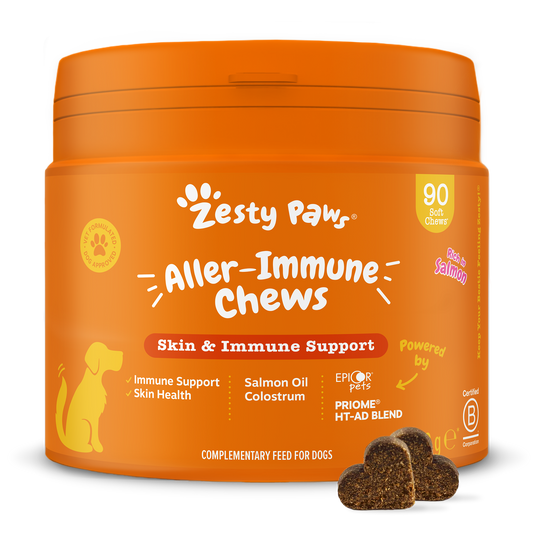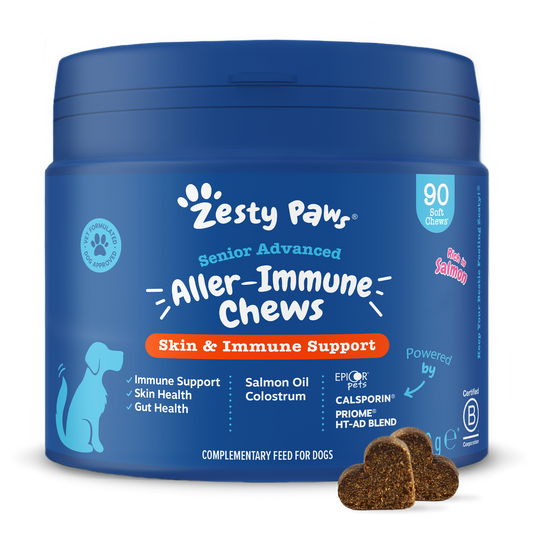Watching your pup scratch non-stop can be very distressing. Canine itchy skin is a common issue that can stem from various causes. So this guide will walk you through some of the common reasons behind your dog's itchy skin, and share some “pawsome” ideas to help your furry friend find support and return to tail-wagging joy.
Why Is My Dog Itching and Scratching?
There are several reasons why your dog might be scratching more than usual. Let's dive into the most common culprits:
Allergies
Allergic reactions are one of the top reasons for itching. These allergies can come from:
-
Food Allergies: Some ingredients in your dog's food might be the sneaky culprits causing that itch.
-
Environmental Allergies: Pollen, dust mites, mould and some plants and grasses around the house and garden can trigger allergic reactions.
-
Flea Allergies: One tiny flea bite can send your dog into a scratching frenzy if they're allergic to flea saliva.
Pesky Parasites
Parasites like fleas, ticks and mites can cause severe itching. These little invaders can leave your dog miserable and even cause bumps on the dog's skin.
Infections
Bacterial and fungal infections are sneaky causes of itching. These infections often occur when your dog's skin is irritated or damaged, allowing bacteria or fungi to move in. And the inevitable scratching only makes things worse.
Dry Skin
Dry skin can make your dog scratch like mad. This can be due to low humidity, too-frequent bathing, or a diet lacking essential fatty acids.
Hot Spots
Hot spots, or acute moist dermatitis, are localised areas of skin inflammation and infection. They are typically red, moist and painful, causing intense itching and scratching.
How Do I support my dog with itching?
Now that we've identified the potential causes, let's discuss how to help support against itching and get your dog back to tail-wagging happiness.
-
Regular Grooming: Regular grooming is essential. It helps remove allergens, dirt and loose fur that can cause itching. Plus, it gives you a chance to spot any parasites early.
-
Flea and Tick Prevention: Using flea and tick preventatives is crucial. Various options are available, including topical treatments, oral medications and flea collars. Keeping those pests at bay is key to reduce the risk of allergy-related symptoms.Dietary Adjustments: If food allergies are the issue, switching to a hypoallergenic diet can help, but sometimes just a change of the regular food is enough. Ensure the diet is rich in essential fatty acids, which maintain healthy skin and coat.
-
Bathing: Regular baths with a gentle, hypoallergenic shampoo can soothe itchy skin. Oatmeal-based shampoos are particularly effective in calming irritated skin.
Supplements for Itchy Dogs
Adding supplements to your dog's diet can maintain skin health and reduce the risk of itching. Omega-3 and Omega-6 fatty acids, found in fish and flaxseed oils, or in supplements such as Zesty Paws® Omega Skin & Coat Chews, are excellent for maintaining healthy skin. Check out Zesty Paws® Allergy and Immunity Chews with salmon oil and postbiotics.
Dog Itching Remedies
Here are some topical home remedies and over-the-counter treatments that can help alleviate your dog's itching:
-
Apple Cider Vinegar: Diluted apple cider vinegar can be applied to itchy spots to provide relief. Its antibacterial and antifungal properties help soothe the skin.
-
Coconut Oil: Coconut oil can be applied directly to the skin or added to your dog's diet. It moisturises dry skin and has anti-inflammatory properties.
-
Aloe Vera: Aloe vera gel can soothe irritated skin and reduce itching. Try to find pure aloe vera for best soothing effect.
-
Colloidal Oatmeal Baths: An oatmeal bath can provide instant relief from itching. Colloidal oatmeal has anti-inflammatory properties that calm the skin.
When to See a Vet
While topical home remedies and over-the-counter treatments can be effective, it's essential to consult a vet if:
-
Your dog's itching persists despite treatment.
-
You notice open wounds, excessive redness or pus.
-
Your dog shows signs of a severe allergic reaction, such as swelling or difficulty breathing.
A vet can provide a proper diagnosis and recommend prescription treatments if necessary.
Understanding Rashes and Bumps on Dogs' Skin
Itchiness on your dog’s skin can often be accompanied by an irritating rash or bumps. Dermatitis, dog rashes and bumpy skin can be alarming, but are often manageable with the right approach.
Identifying Bumps on Your Dogs' Skin
Bumps can vary in size and cause. Some common types include:
-
Papules: Small, raised bumps often caused by allergies or insect bites.
-
Pustules: Bumps filled with pus, indicating a bacterial infection.
-
Nodules: Larger lumps that may be benign, but sometimes require medical attention.
For a correct diagnosis and effective treatment, it’s always best to ask your vet to check your dog over if these bumps occur.
Supplements for Itchy Dogs
In addition to dietary adjustments, there are some specific supplements designed for your pet that can support skin health and reduce the risk of itching. As always, when addressing conditions in your dog it’s a good idea to have a chat with your vet first.
Omega-3 Fatty Acids
Omega-3 fatty acids in fish oil reduce inflammation and support skin and coat health. They are particularly beneficial for dogs with dry skin. Zesty Paws® Omega Skin & Coat Chews contain high-quality fish oil rich in Omega-3 and additional vitamins.
Vitamin E
Vitamin E is a powerful antioxidant that supports skin health. It can be applied topically or given as a supplement. You’ll find vitamin E in supplements such as Zesty Paws® Omega Skin & Coat Chews.
Probiotics
Probiotics support gut health, which is closely linked to skin health. They can help manage allergies and maintain overall wellbeing. Take a look at Zesty Paws® Probiotic Chews which contain a mix of probiotics and postbiotics which help support healthy digestion.
Zinc
Zinc is essential for skin maintenance, while a deficiency can lead to skin problems and increased itching.
Ensuring Your Dog's Comfort
All dogs enjoy a good scratch now and then, but excessive scratching and broken skin or rashes can indicate various underlying issues, from allergies to parasites. Understanding the cause of your dog's discomfort and applying appropriate topical remedies can help ensure your furry friend stays comfortable. Regular grooming, proper diet and effective topical remedies can make a significant difference.
Always consult your vet for persistent issues to ensure your dog gets the best care possible.





